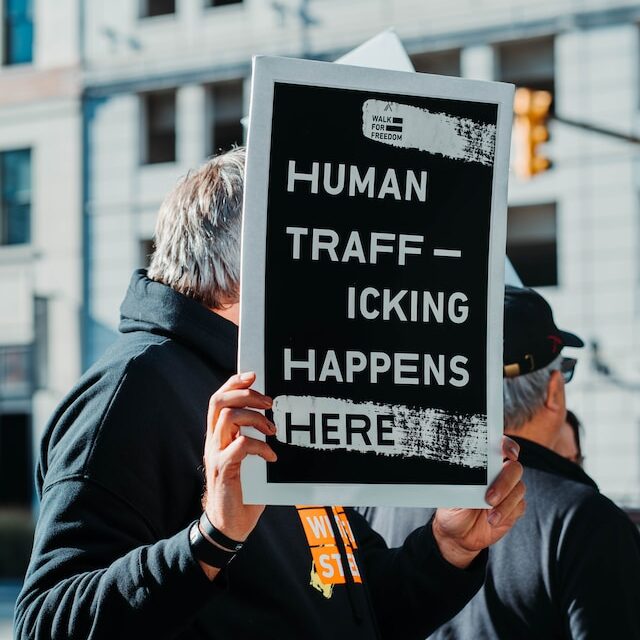With its seventh National Action Plan for Fighting Human Trafficking, 2024-2027, Austria is continuing its consistent strategy in the struggle against one of the most serious human rights violations. Created by the Council of Ministers on 13 March 2024, the Plan is a comprehensive state tool which takes a clear position against any form of human trafficking. From sexual exploitation to labour exploitation, child trafficking and exploitation for the purpose of begging. The goal of the plan is to develop the existing package of measures further, improve coordination and strengthen the rights of those affected.

Background to the National Action Plan
Human trafficking is a complex, cross-border form of criminality. Austria has pursued a strategic approach since 2004, coordinated by the Human Trafficking Task Force, located at the Foreign Ministry (BMEIA). The Task Force brings together representatives of all relevant ministries, the Länder, social partners and organisations from civil society.
Structure of the Action Plan
The NAP 2024–2027 includes five fields of activity, underpinned by a total of 103 concrete measures:
- Coordination and Cooperation
- Prevention
- Victim Protection
- Prosecution
- Evaluation and Monitoring
This structure provides continuity, but at the same time allows for content-related and operational redevelopments relative to previous Action Plans.
Coordination and Cooperation
In national and international coordination, the focus is on ensuring effective cooperation at all levels. At the EU und internationaler level, therer will be stronger cooperation with partner states, international organisations and NGOs. Particular attention will be paid to creating stronger linkage with the Austrian Länder and the targeted inclusion of civil society.
Prevention

Prevention is a key factor in the elimination of human trafficking. The Action Plan foresees the following measures:
- Sensitisation campaigns for school pupils, professional groups and the general public.
- Target group-specific information materials, primarily also in several languages.
- Events and training for specialist staff in justice, the police, health service and care institutions.
- Combatting demand, through measures against labour exploitation in supply chains, for example.
- Stronger integration of digital channels and social media to increase range.
The goal is to create risk awareness, communicate the legal framework conditions and discourage potential offenders.
Victim Protection
Dealing with victims in a manner conforming with their human rights is of key importance here. Amongst other things, the NAP pursues the following measures to protect and support those affected:
- Early recognition of those affected by means of standardised indicators.
- Strengthening of victim protection structures, including the expansion of specialised care institutions.
- Access to compensation and legal representation, including through integration of experts from both justice and administration.
- Implementation of the Non-Punishment Principle: Victims should not be punished for crimes they have committed under duress.
- Focus on child protection through special measures, as in asylum and care system.
- Psychosocial and legal support for particularly endangered groups. such as trans people or people with disabilities.
Prosecution
Consistent prosecution of human traffickers and offenders remains a fundamental goal. Amongst other things, the NAP does the following on this issue:
- Analysis and possible adaptation of basic legal principles (in Criminal Code, for example).
- Training sessions for prosecuting authorities to enable them to recognise and combat the offence.
- Funding of interdisciplinary cooperation, between police and NGOs, for example.
- Financial investigations and securing of criminally-gained assets to be used for compensation of victims.
- Focus on exploitation structures and criminal networks, not just individual offenders.
International legal aid and police cooperation should also continue to be intensified in future.
Evaluation and Monitoring
The NAP 2024–2027 defines clear responsibilities, deadlines and indicators for checking progress. These include:
- Regular reports from the work groups to the Task Force.
- Evaluations based on measurable criteria such as victim numbers, judgements or recognition level of information campaigns.
- Annual checking and adjustment of measures by Human Trafficking Task Force and its experts.
- In this way, the transparency and traceability of implementation should be ensured.
Strategic redevelopments on earlier plans
There are several new focal points compared to the previous Plan (2021–2023):
- Stronger structural anchoring of victim protection measures
- Expansion of digital prevention strategies
- Concretisation of responsibilities of Länder and local councils
- Improvement of data situation and scientifjc support
In addition to this, seven strategic goals were defined which represent the baseline for implementation. Amongst other things, these were for the strengthening of international cooperation and the improvement of protection for children.
Focus issues: Child trafficking, sexual exploitation, labour exploitation
In the National Action Plan, forms of human trafficking require particular attention. These include labour exploitation, child trafficking and sexual exploitation in particular.
- Labour exploitation often affects people in care, agriculture or the construction sector. Examples of what the NAP funds in this field include labour law checks and offers of information for migrants.
- Child trafficking should be prevented by special protective measures, monitoring at care institutions and cooperation with youth welfare.
- Sexual exploitation, which primarily affects women, remains a core issue, as do measures against digital recruiting and new forms of exploitation.
Conclusion: A strong signal against exploitation
The National Action Plan 2024–2027 is a comprehensive, strategically-oriented tool in the fight against human trafficking. With a broad catalogue of measures, clear responsibilities and targeted international networking, Austria is sending a strong signal: human trafficking will not be tolerated, whether it be in the shadows or openly, offline or online. The strengthening of victim protection, consistent prosecution and preventative education are not isolated measures, however, but parts of a mission for society as a whole.
Translated by Tim Lywood
#Menschenhandel #NationalerAktionsplan #Österreich #NAP2024 #Opferschutz #Prävention #Strafverfolgung #Ausbeutung

